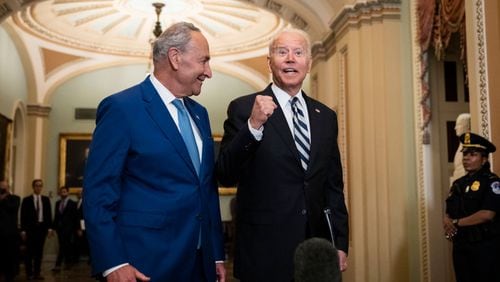As Democrats work to finalize a sweeping $3.5 trillion tax and spending package in Congress, their leaders must somehow thread the ultimate legislative needle in the days ahead — by securing the support of almost every single one of their members on Capitol Hill.
“Let’s stay united in our quest,” Speaker Nancy Pelosi implored her fellow Democrats.
I wrote last week about how history was hanging over the shoulder of Democrats, as the party’s last two big legislative efforts in 1993 and 2010 resulted in historic losses in the next midterm election.
But back then, Democrats had extra votes to work with. Their comfortable majorities made it easier to approve a deficit-reduction package in 1993 and the Obama health law in 2010.
2021 is much, much different. Democrats cannot lose a single vote in the Senate, and they can only afford to lose three votes in the House.
No Republicans are in play to support this bill. State GOP lawmakers used committee meeting after committee meeting this past week to denounce the measure.
“Democrats want to spend your money on what they want,” fumed U.S. Rep. Buddy Carter, R-Pooler.
“For Joe Biden, it’s everybody first — except America,” said U.S. Rep. Drew Ferguson, R-West Point.
Of the 14 members in Georgia’s Congressional delegation, only the vote of U.S. Rep. Carolyn Bourdeaux, D-Suwannee, would seem to be in any doubt at this point. She is one of a handful of moderates who have raised questions about the direction of the budget plan.
As one of her committees voted on a portion of the reconciliation bill, Bourdeaux said Democrats need to ‘do this responsibly.’
“That means a bill that is fully paid for and thoughtfully crafted,” Bourdeaux declared.
How to define ‘responsibly’ or ‘thoughtfully’ will be up to Bourdeaux and a small number of other moderate Democrats who are certain to see intense pressure from their leaders and outside groups to support the plan.
Bourdeaux has already received an earful from progressives, unions, and voters who feel she should be on board 100% with this package, jabbing at her on social media with a refrain of “Come on Carolyn.”
Back in 1993, Democrats had enough wiggle room for victory that six of their Senators — including Georgia’s Sam Nunn — voted against the Clinton deficit plan.
This time, losing just one Senator would derail a gigantic chunk of President Biden’s legislative agenda.
“We have to come together,” said U.S. Senate Majority Leader Charles Schumer, who must balance Senate colleagues who want more than $3.5 trillion against those who want less.
The next few weeks will not only test the unity of Democrats — but maybe their political future as well.
Jamie Dupree has covered national politics and the Congress from Washington, D.C. since the Reagan administration. His column appears weekly in The Atlanta Journal-Constitution. For more, check out his Capitol Hill newsletter at http://jamiedupree.substack.com
About the Author







